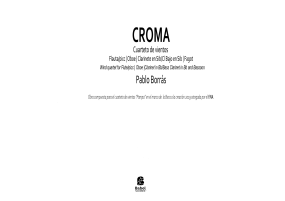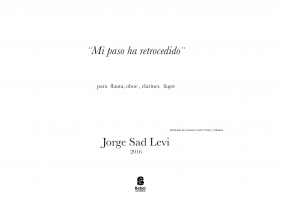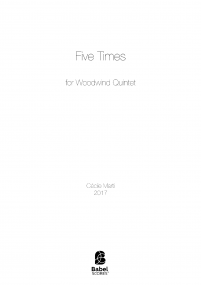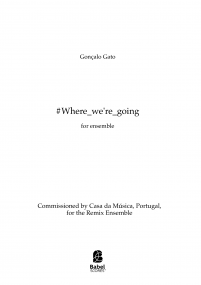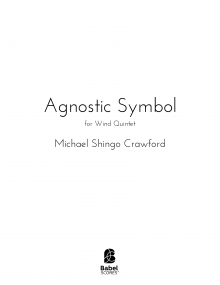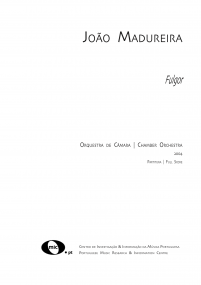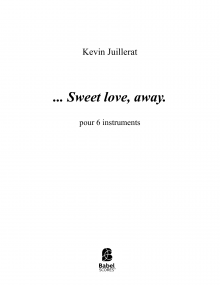Recherche avancée
Le Critérion
#56 (2000/2008)
9,27 €
Version papier (+14,80 € impression et livraison ). Colissimo7-14 days aprox.
Version numérique (+0,00 €) à télécharger
Chez BabelScores, quand vous achetez une partition, vous pouvez ensuite contacter directement le compositeur ici même !
Caractéristiques
Region
Europe
Estimated Duration
6 - 10min
Date
2008
ISMN : 979-0-2325-0960-0
Notes sur cette pièce
In Le Critérion, the expression I was interested in presenting was similar to Edward Said’s notion of an artwork exhibiting “intransigence, difficulty, and unresolved contradiction” in order to provide an “occasion to stir up more anxiety, tamper irrevocably with the possibility of closure and leave the audience more perplexed than before … to explore … a non-harmonious, non-serene tension, and above all, a sort of deliberately unproductive productiveness, going ‘against’...”
Murray Gell-Mann (Nobel Prize, 1969, for his work on quarks) identified that many quantities for complexity have been proposed, and that a variety of different measures are required to capture intuitive ideas about complexity and simplicity. Take for instance time/space measures – Gell-Mann suggested that one reliable indicator of complexity consists of how long it took a computer to perform any particular task, or the number of steps required to carry out a computation; whereas measures of information were related to the length of the shortest message conveying certain information. However, in ordinary conversation, the measure that corresponds to what is meant by complexity corresponded not to the “length of the most concise description” but rather the “length of concise description of a set of the entity’s regularities”. So that in a message that is effectively random, with practically no regularities: the effective complexity will be near zero. In a message that is completely regular, bit string of zeros, or perhaps an invariant rhythmic stream, the effective complexity may be near zero. However, in a message featuring effective complexity, complexity is high only in a region which is intermediate between total order and complete disorder.
Ajouter à une playlist
- Identifiez-vous pour créer une liste
In Le Critérion, the expression I was interested in presenting was similar to Edward Said’s notion of an artwork exhibiting “intransigence, difficulty, and unresolved contradiction” in order to provide an “occasion to stir up more anxiety, tamper irrevocably with the possibility of closure and leave the audience more perplexed than before … to explore … a non-harmonious, non-serene tension, and above all, a sort of deliberately unproductive productiveness, going ‘against’...”
Murray Gell-Mann (Nobel Prize, 1969, for his work on quarks) identified that many quantities for complexity have been proposed, and that a variety of different measures are required to capture intuitive ideas about complexity and simplicity. Take for instance time/space measures – Gell-Mann suggested that one reliable indicator of complexity consists of how long it took a computer to perform any particular task, or the number of steps required to carry out a computation; whereas measures of information were related to the length of the shortest message conveying certain information. However, in ordinary conversation, the measure that corresponds to what is meant by complexity corresponded not to the “length of the most concise description” but rather the “length of concise description of a set of the entity’s regularities”. So that in a message that is effectively random, with practically no regularities: the effective complexity will be near zero. In a message that is completely regular, bit string of zeros, or perhaps an invariant rhythmic stream, the effective complexity may be near zero. However, in a message featuring effective complexity, complexity is high only in a region which is intermediate between total order and complete disorder.
Instrumentation
Flute|Oboe|Clarinet|Bassoon
Score Details
Format - A4 / US let
Pages - 28
Pages - 28
Customers Who Viewed This Piece Also Viewed:




